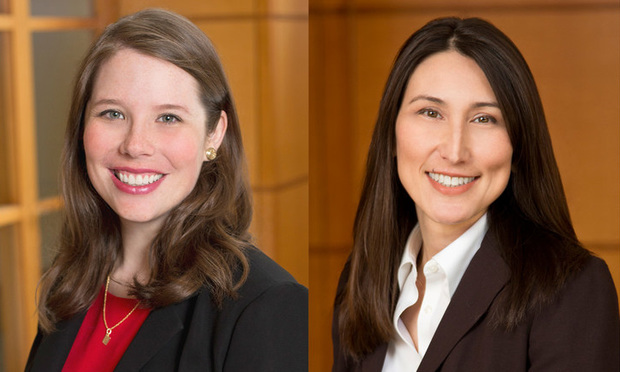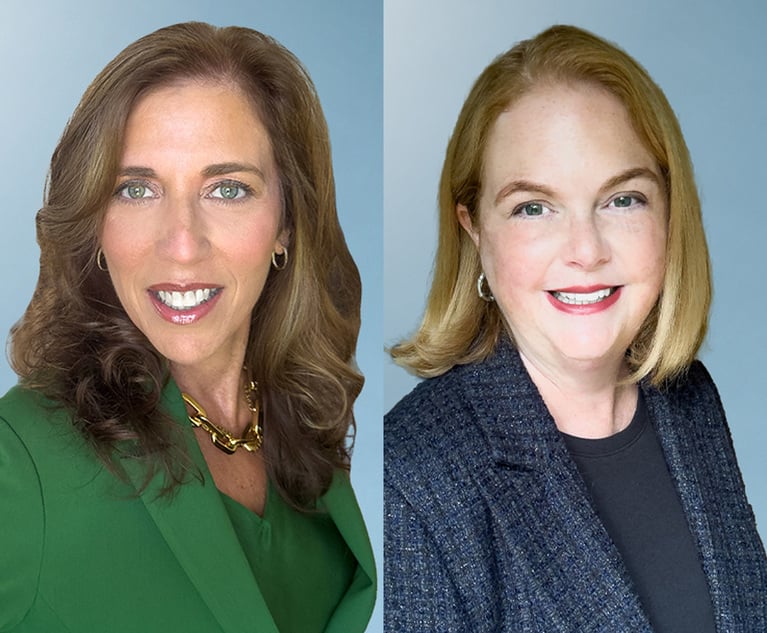Standing Up to Attorney Substance Abuse
While many lawyers are perfectionists in their practice, success in the practice of law can come at the expense of attorneys' own well-being.
March 21, 2018 at 12:41 PM
6 minute read

The legal profession is demanding. Client, peer, and self-imposed pressure often creates high stress levels within a law firm and for individual attorneys. While many lawyers are perfectionists in their practice, success in the practice of law can come at the expense of attorneys' own well-being.
Substance abuse is pervasive in the legal community. Studies consistently show that lawyers have higher rates of drug and alcohol abuse and mental illness compared to the rest of the working population.
The ABA has recently decided to take action on this issue. At its midyear meeting in Vancouver in February of this year, the American Bar Association's House of Delegates adopted a resolution urging legal employers to take concrete and immediate action to address the high rates of substance abuse and mental health issues for attorneys. While a nonbinding resolution, this step by the ABA demonstrates the prevalence and seriousness of the issue.
The ABA's resolution arises from a landmark study published two years ago by the Hazelden Betty Ford Foundation and the ABA's Commission on Lawyer Assistance Programs. This study highlighted troubling trends. According to the study, 21 percent of working attorneys qualify as “problem drinkers,” 28 percent deal with depression, and 19 percent struggle with anxiety issues. The study, which has been widely acknowledged as the most comprehensive of its kind, also showed that attorneys with less than ten years' experience are the most likely to suffer these problems. Remarkably, nearly 1 in 3 younger lawyers are “problem drinkers.” And this study came on the heels of a study of law school students that showed similar trends.
While it is clear that substance abuse is a serious issue impacting our legal community, the stigma surrounding substance abuse often makes it difficult for individuals to ask for help or for attorneys with concerns about their colleagues to take appropriate action. But many law firms and attorneys have decided it is critical for their members to provide support to colleagues suffering from substance abuse or other mental health issues. As the saying goes, a chain is only as strong as its weakest link.
The goal is to create an environment in which afflicted attorneys feel comfortable in reaching out for help and support. To achieve that end, many attorneys and law firms find the following steps helpful.
Mentoring Programs
Perhaps one of the most troubling findings from the ABA's study is that new attorneys suffer the highest rates of substance abuse and depression. A common assumption has often been that substance abuse develops as an attorney continues later into their career, as an outlet for coping with new types of stress, the mundane repetition of work, and/or challenges in their personal lives. And while that may be true for some, it may be that younger attorneys need the most attention or even treatment.
In order to help younger attorneys, law firms can consider promoting both official and unofficial mentoring programs. Mentors can range from peers to senior attorneys in the firm. These channels serve two purposes. First, they can match struggling young attorneys with someone to whom the attorney can privately discuss any concerns or issues. Second, they often allow more senior attorneys to identify individuals that may need assistance.
It is important to remember that the goal in most mentorship programs is not to create a witch hunt or to convey a paternalistic culture of absolute abstinence. Many attorneys are able to have a few drinks to celebrate or blow off steam without it interfering with their lives. However, studies show that persons suffering from substance abuse are often alone. Thus, employing mentors within a firm can help bridge the gap between isolation and candid discussions regarding a possible problem.
Inform Attorneys and Take Advantage of Programs
Many attorneys with substance abuse or mental health disorders take advantage of bar-sponsored programs. Others may not realize that state bar organizations, including California's, provide resources and counseling to those who need help. These resources are helpful both for people struggling with matters of addiction as well as for those who need assistance in figuring out how to help a struggling colleague.
Helpful tools exist beyond the state bar. Some firms have the benefit of Employee Assistance Programs (EAPs) through their malpractice insurer, which are used to help or provide coverage for treating these issues. There are many comprehensive programs that provide positive results, but the first step is to make sure that attorneys are aware that help is just a call away.
A Positive Firm Culture
A law firm's culture is as unique as the personalities of its partners and employees. While there is no singular “right” culture for all law firms, the goal for many law firms is to create a supportive environment for all employees needing assistance or intervention.
For example, a firm's culture may dictate whether attorneys, especially young attorneys, feel comfortable with asking for help. This culture can be created through the implementation of proactive measures that help identify substance abuse and mental health issues, and then provide avenues for attorneys to seek help.
As noted, victims of substance abuse and individuals suffering with mental health issues may feel that they are alone. Without a strong culture, attorneys may suffer in silence due to concerns that seeking help will cause them to either lose their job or suffer a reputational hit from which they cannot recover. Indeed, in firms where the “work hard, play hard” mentality prevails, a young attorney may be afraid to come forward and be deemed weak or unworthy.
Based on the statistics, the unfortunate reality is that attorneys are likely not the only ones at their firm suffering from substance abuse issues. By providing attorneys with the support they need to overcome these issues, law firms can help turn the statistics around.
Shari L. Klevens is a partner at Dentons US and serves on the firm's US Board of Directors. She represents and advises lawyers and insurers on complex claims, is co-chair of Dentons' global insurance sector team, and is co-author of “California Legal Malpractice Law” (2014). Alanna Clair is a partner at Dentons US and focuses on professional liability defense. Shari and Alanna are co-authors of “The Lawyer's Handbook: Ethics Compliance and Claim Avoidance.”
This content has been archived. It is available through our partners, LexisNexis® and Bloomberg Law.
To view this content, please continue to their sites.
Not a Lexis Subscriber?
Subscribe Now
Not a Bloomberg Law Subscriber?
Subscribe Now
NOT FOR REPRINT
© 2025 ALM Global, LLC, All Rights Reserved. Request academic re-use from www.copyright.com. All other uses, submit a request to [email protected]. For more information visit Asset & Logo Licensing.
You Might Like
View All
Once the LA Fires Are Extinguished, Expect the Litigation to Unfold for Years
5 minute read

Faegre Drinker Adds Three Former Federal Prosecutors From Greenberg Traurig
4 minute read
Anapol Weiss Acquires Boutique Led by Star Litigator Alexandra Walsh
5 minute readTrending Stories
- 1'Astronomical' Interest Rates: $1B Settlement to Resolve Allegations of 'Predatory' Lending Cancels $534M in Small-Business Debts
- 2Senator Plans to Reintroduce Bill to Split 9th Circuit
- 3Law Firms Converge to Defend HIPAA Regulation
- 4Judge Denies Retrial Bid by Ex-U.S. Sen. Menendez Over Evidentiary Error
- 5Lawyers: Meet Your New Partner
Who Got The Work
J. Brugh Lower of Gibbons has entered an appearance for industrial equipment supplier Devco Corporation in a pending trademark infringement lawsuit. The suit, accusing the defendant of selling knock-off Graco products, was filed Dec. 18 in New Jersey District Court by Rivkin Radler on behalf of Graco Inc. and Graco Minnesota. The case, assigned to U.S. District Judge Zahid N. Quraishi, is 3:24-cv-11294, Graco Inc. et al v. Devco Corporation.
Who Got The Work
Rebecca Maller-Stein and Kent A. Yalowitz of Arnold & Porter Kaye Scholer have entered their appearances for Hanaco Venture Capital and its executives, Lior Prosor and David Frankel, in a pending securities lawsuit. The action, filed on Dec. 24 in New York Southern District Court by Zell, Aron & Co. on behalf of Goldeneye Advisors, accuses the defendants of negligently and fraudulently managing the plaintiff's $1 million investment. The case, assigned to U.S. District Judge Vernon S. Broderick, is 1:24-cv-09918, Goldeneye Advisors, LLC v. Hanaco Venture Capital, Ltd. et al.
Who Got The Work
Attorneys from A&O Shearman has stepped in as defense counsel for Toronto-Dominion Bank and other defendants in a pending securities class action. The suit, filed Dec. 11 in New York Southern District Court by Bleichmar Fonti & Auld, accuses the defendants of concealing the bank's 'pervasive' deficiencies in regards to its compliance with the Bank Secrecy Act and the quality of its anti-money laundering controls. The case, assigned to U.S. District Judge Arun Subramanian, is 1:24-cv-09445, Gonzalez v. The Toronto-Dominion Bank et al.
Who Got The Work
Crown Castle International, a Pennsylvania company providing shared communications infrastructure, has turned to Luke D. Wolf of Gordon Rees Scully Mansukhani to fend off a pending breach-of-contract lawsuit. The court action, filed Nov. 25 in Michigan Eastern District Court by Hooper Hathaway PC on behalf of The Town Residences LLC, accuses Crown Castle of failing to transfer approximately $30,000 in utility payments from T-Mobile in breach of a roof-top lease and assignment agreement. The case, assigned to U.S. District Judge Susan K. Declercq, is 2:24-cv-13131, The Town Residences LLC v. T-Mobile US, Inc. et al.
Who Got The Work
Wilfred P. Coronato and Daniel M. Schwartz of McCarter & English have stepped in as defense counsel to Electrolux Home Products Inc. in a pending product liability lawsuit. The court action, filed Nov. 26 in New York Eastern District Court by Poulos Lopiccolo PC and Nagel Rice LLP on behalf of David Stern, alleges that the defendant's refrigerators’ drawers and shelving repeatedly break and fall apart within months after purchase. The case, assigned to U.S. District Judge Joan M. Azrack, is 2:24-cv-08204, Stern v. Electrolux Home Products, Inc.
Featured Firms
Law Offices of Gary Martin Hays & Associates, P.C.
(470) 294-1674
Law Offices of Mark E. Salomone
(857) 444-6468
Smith & Hassler
(713) 739-1250






